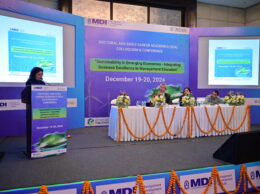New Delhi: The MSME sector, the national economic structure’s backbone, has demonstrated resilience to global economic shocks and adversities during the pandemic. This industry which has consistently registered a higher growth rate than the overall industrial sector, is today reeling under business pressure due to delayed payment cycle. Nearly INR 17,500 Crores have been claimed by MSEs (Micro and Small Units), as per the MSME SAMADHAAN – Delayed Payment Monitoring Portal.
Chapter V of the MSMED Act, provisions to deal with micro and small-scale industries’ financial difficulties, encompasses the Recovery of the Outstanding dues from the Buyer. Authorised Suppliers may refer to the Council, conduct conciliation, or seek alternate dispute resolution services subject to terms and conditions. Financial difficulties that micro and small-scale industries face due to delayed payments limit business growth and expansion and put undue pressures on the MSME Entrepreneur. The ’Digital Prarambh’ series was conducted with the support of MSME enablers like Tally Solutions, India’s leading business management software provider, Rayat Raja Agrotech and supporting partner Wadhwani Foundation.
Ravi Nandan Sinha, Director of Development, MSME Business Forum, said, “In the last two decades, the growth curve of the Indian economy contributed by the MSMEs has been substantial. The government has also been proactively promoting business collaboration tools, fintech platforms, and digital enablement for the MSME community to drive economic growth. One such measure is the introduction of TReDS, an online mechanism for providing early payment to suppliers, mandated by the RBI.”
Digital transformation, the new force has fundamentally changed how MSMEs operate and deliver value to customers. The future of MSMEs in India offers a lot of potential in employment generation, local customer satisfaction, minimization of regional imbalance, enhancement of export, and foreign investment. Digitization is helping MSMEs get access to working capital by auctioning their receivables/invoices.
In the post-COVID world, a substantial rise in digital sales channels’ adoption implies digital interactions will hold greater importance instead of traditional businesses. The smart integration of digital technologies, processes, and competencies across all levels and functions are now getting seamless, thereby offering a big thrust on global trade and exports.
Subject matter expert, Somesh Arora, Partner, Sapphire & Sage Law Offices, said, “Two ways to recover dues are Conciliation & Arbitration. Over 60,000 applications have been filed by MSEs (Micro and Small Units) since the launch of the MSME Samadhan in Oct 2017. The rise in delinquency has hit these enterprises and hurt their chances of recovery of their outstanding dues. The MSMED act ensurestimely recovery of the dues and compound interest to be payable to the buyer’s MSME,thereby preventing the loss of the operations and reduced capital during the pendency of an application moved by the MSME. The timeline of disposing of the case in 90 days further ensures speedy redressal of the case. Recently, the MSMED has also introduced an online portal for filing the applications by the micro and small enterprises that further relieves them from the litigation costs.”
Further, by focusing on MSME Sector, the country can generate employment opportunities for the young populace and more business opportunities for entrepreneurs. This can also help in increasing the export business, and reduce India’s imports, which may add value to reduce the rate of price inflation and retain the currency value of India.









